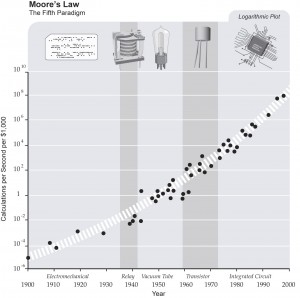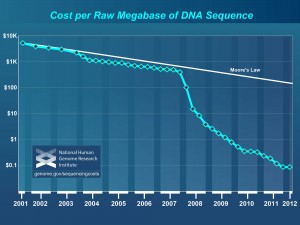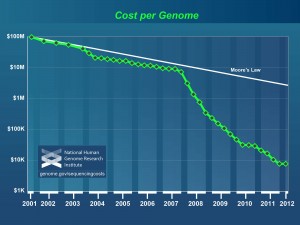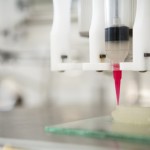The Computer Revolution
The computer revolution changed the world in ways that would never have seemed possible when the first computers were being built. Who would have thought that a machine which is simply able to do basic logical operations of ones and zeroes would lead to so much change? Writing, news, society, banking, the stock market, film, sport, space, robots and so much more – all of these things were changed irrevocably by the advent of the age of the computer, which we are now living in.
Part of what made the computer revolution so powerful was the effect of what is known as Moore’s law. Moore’s law predicts that a computer chip will double in quality every 18 months, leading to incredibly exponential growth. Whether this is sustainable indefinitely or not is another issue, but we know that this law has been what has propelled computers from being the size of entire rooms to being the size of your thumbnail (and more powerful even then!) in under half a decade.
The Genetic Revolution
We are now entering the beginning stages of a new revolution: the genetic revolution. Genetics has been around for a long time now, with technology steadily advancing with it. But we are now witnessing a phenomenon of exponential growth similar to that seen with Moore’s law, but faster. Sequencing and Synthesis of DNA are core enabling technologies of genetic engineering and both are currently decreasing in cost (per base pair) at rates faster than Moore’s law.
The human genome project began at an extremely slow rate and was criticised heavily for it, but by its latter years huge amounts of the project were able to be completed due to better technology. Now we are completing genome projects of organisms within the space of single years, for much cheaper costs. There is now a 1,000 human genome project and even more ambitiously a 10,000 vertebrate genome project (among many many others).
With the rapid increase in both computer and biological technology, the genetic revolution is going to pave the way for synthetic biology to change the world. The technology is already in our hands, and soon it will be capable of doing more than we can imagine – the limiting factor is our imagination and our ingenuity.
| Previously – Synthetic Biology | Next Up – Hacking Biology |
















